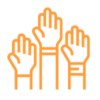
The Convention on the Rights of the Child contains 54 articles that deal with children’s rights and are based on the principle that all children are of equal value. In recent years, the UN has produced 3 additional protocols that entail additional rights for children in the countries that sign the protocols. Sweden has ratified the first and second protocol on children in armed conflict and trafficking in children, child prostitution and child pornography.
The third protocol would mean that children and their representatives may send complaints to the Committee on the Rights of the Child if they feel that their rights have been violated and not taken seriously in their home country. This would also put pressure on Sweden to review the system for how we deal with violations of the Convention on the Rights of the Child.
By right of appeal we mean the Third Additional Protocol to the Convention on the Rights of the Child, which means that children who experience a violation may submit a complaint to the Committee on the Rights of the Child. Children in countries that ratify (commit to) this Protocol may apply to the Committee on the Rights of the Child if they do not receive assistance in their home country.
By committing to this protocol, Sweden will need to review how violations of the Convention are handled and sharpen its handling of this. Children will be able to pursue cases without guardians and have the right to claim their rights. This gives children & young people a stronger role in society. It is a right to have one’s case tried and it should apply to children as well!
The Children’s Ombudsman has pointed out two major shortcomings with regard to children’s rights in Sweden. The right to be heard, and the right to have one’s case tried when a violation occurs.
We want Sweden to sign the additional protocol, but also introduce child-friendly processes that are easy for children to understand and take part in. These two points go into each other.
This would strengthen the role of children in society and enable children to pursue cases without guardians. The Convention on the Rights of the Child will be taken more seriously and children can be rehabilitated if the system fails.
Unfortunately, many children fall between the chairs today. See Maria, Kim and Samir’s stories.
Today, there is no single place where all children can turn if they experience a violation. Authorities to which children today can turn have different conditions to pursue cases and unfortunately do not cover all rights.
In most cases, children must have a guardian’s signature to file a complaint, which makes it difficult for children who do not have a guardian’s support. Processes involving authorities are also not child – friendly. For example, decisions by authorities have difficult wording. Authorities and courts are also difficult to access or unknown to children.
One of the heaviest arguments has been to wait until the Convention on the Rights of the Child became law, which it became on 1 January this year. Therefore, we believe it is time for the issue to be raised again!
The Committee on the Rights of the Child believes that if children’s rights (the Convention on the Rights of the Child) are to be important, effective and child-friendly processes are needed that can compensate children who experience a violation.
Children are dependent on adults, which makes it difficult to lodge complaints when rights are violated. The state must therefore ensure that it is possible for children and those who represent children to easily take part in the legal system. Examples are child-adapted information and legal assistance. Children shall also have the right to redress (compensation) if the violation has taken place. This can take the form of, for example, readjustment, rehabilitation or damages.
The Committee on the Rights of the Child also believes that civil, political, economic, social and cultural rights should be subject to judicial review.
Article 4 of the Convention on the Rights of the Child (which is law) states that the State is responsible for ensuring that there are appropriate measures to ensure that children’s rights are complied with.

Children who experience bullying at school can turn to either the Children and Student Delegate (BEO) or the Discrimination Delegate (DO). Where the child should turn depends on the type of bullying or abuse that has taken place. The two instances are handled differently. In addition, the cases involving both harassment and violation often fall between the cracks.

Children who have contact with the social services may encounter several challenges. Among other things, they may experience difficulties in formulating themselves in a way that causes them to be taken seriously by adults. A child who is denied care by the social services is also not entitled to public assistance.

In matters concerning children and asylum, the best interests of the child are often overlooked. There are major shortcomings in the interaction between authorities and in many cases the Convention on the Rights of the Child is not complied with.
The stories are fictional and inspired by cases developed by Nätverket för Barnkonventionen